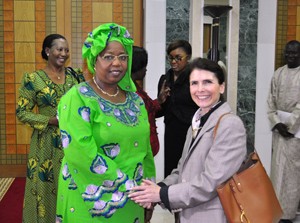
As a focus country for both the A Promise Renewed and UN Commission on Life Saving Commodities initiatives, Senegal has created an integrated plan for child survival and assuring access to live saving commodities.
For Immediate Release
Dakar, July 5, 2013 – Through the U.S. Agency for International Development (USAID), the United States participated in Senegal’s launch today of a National Child Survival Action Plan as a commitment to save more than 10,000 mothers and children from death by preventable diseases in the next two years.
USAID has worked closely with the Government of Senegal to develop an evidence-based, budgeted, country-owned and led plan, through which Senegal is joining the A Promise Renewed movement led by participating governments and supported by donors and partners in close collaboration with UNICEF. A Promise Renewed unites civil society, faith based organizations, the private sector, and governments globally around the goal of fewer than 20 under-five deaths per 1,000 live births by 2035.
“Through this Action Plan, Senegal is taking an important step towards eliminating preventable deaths among children under five,” Katie Taylor, USAID’s Deputy Assistant Administrator for Global Health said at the launch.
USAID, the largest bilateral donor to Senegal, is financing much of the Plan’s implementation, with key support from UNICEF. Today’s launch took place as part of the U.N. Commission on Life-Saving Commodities meeting here in Dakar. As a focus country for both the A Promise Renewed and UN Commission on Life Saving Commodities initiatives, Senegal has created an integrated plan for child survival and assuring access to live saving commodities.
This approach reflects the understanding that to achieve reductions in child mortality, a reliable supply of key drugs and commodities is needed. By linking the challenges and solutions for both initiatives in one plan, Senegal has demonstrated a strong commitment to improving the entire health system to make improving health a reality.
The Action Plan ensures the continuous availability and regular use of 17 essential, overlooked commodities for maternal health, reproductive health, newborn health, and child health. Availability of these commodities will drive effective and affordable interventions such as healthy timing and spacing of pregnancy, stopping post-partum bleeding, cleaning newly cut umbilical cords, and treating diarrhea.
In addition to the 13 commodities recommended by the World Health Organization, the Government of Senegal has also included four country-specific interventions, which taken together will help achieve a reproductive, maternal, neonatal, and child health continuum of care.
Senegal’s Action Plan is one of eight presented this week during the follow up meeting to recommendations presented in Abuja, Nigeria, last October. This week, ministers of health and representatives from eight focus countries, along with technical experts from implementing organizations, shared best practices and progress achieved in formulating their country action plans and strategies. Through workshops and technical sessions, participants worked on honing country action plans, creating global and country specific milestones, gaining a common method of monitoring and reporting on success, and sharing knowledge to galvanize in country action.
By creating these action plans and strategies, countries are renewing their engagement and demonstrating country-led commitment to reaching the UN’s millennium Development Goals (MDG) 4 and 5, which seek to reduce the under-five mortality rate by two thirds and reduce the maternal mortality rate by three quarters, respectively.
“This is one step in the fight to end preventable child deaths within a generation,” Ms. Taylor said.







Comment
Make a general inquiry or suggest an improvement.